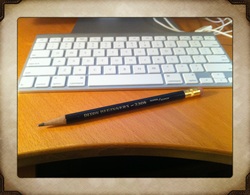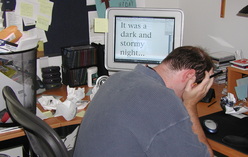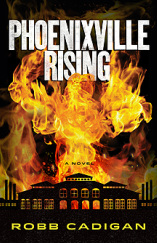
Many people have a romantic idea of the writing life. It’s understandable. A writer just makes up stories out of thin air, after all, while sipping a latte and banging away on a laptop in a coffeeshop somewhere. That’s all there is to it.
Um, I wish. Unfortunately, this quote by author Gene Fowler is a little more accurate: “Writing is easy: all you do is stare at a blank sheet of paper until drops of blood form on your forehead.”
It took me over ten years to write PHOENIXVILLE RISING. Over ten years of blood, sweat, and tears. Ten years.
I know, right?
OK, not ten straight years of working only on this one story. I wrote other things in the meantime, including two other novels (and false starts on two others). But a portion of my psychic RAM was always devoted to PHOENIXVILLE RISING. And over the last 18 months, I concentrated 100% on a complete rewrite and fine-tuning of that original manuscript.
See, more than ten years ago, I wrote IT ALL COMES BACK, a novel that was the precursor to PHOENIXVILLE RISING. That story has many of the same elements of the current book. It’s a coming-of-age story, with crime elements, set in an abandoned steel mill. The novel moves back and forth in time between the beginning of the iron & steel industry (19th century) and the end of the mill (1980). That story was set in a “thinly veiled” version of Phoenixville, in a town called “Wiltondale.” There were other elements that have been stripped away over the years, but the same basic skeleton is there. And yes, I wrote most of that manuscript on a laptop, while hanging out in coffeeshops and libraries. But there was a whole lot more that went into this book than just making up stories out of thin air.
Here's a glimpse:
RESEARCH
Every story requires research. Whether you’re writing a straight-forward police procedural or a story set in a school for young wizards, everything must be rooted in reality. Because PHOENIXVILLE RISING is set primarily in two different time periods, neither of which is present day, I needed to do a lot of research. I did not live through the Civil War, didn’t know Phoenixville when the steel mill was active, didn’t steal car radios as a teenager.
I conducted most of my research at places like the Historical Society of the Phoenixville Area, the Schuylkill River Heritage Center, the Chester County Historical Society, and the Phoenixville Public Library. I watched documentaries and read books about the Civil War and the steel industry. I took long walks around Phoenixville and studied the architecture. And I interviewed Phoenixville residents about their town.
WRITING
I don’t like to talk too much about my actual writing process. I guess I’m superstitious. But I will tell you that I try to stick to a specific word count every week. I tend to write in “bursts,” with some sections coming very easily and others coming out with great pain. And I definitely subscribe to Anne Lamott’s suggestion to write “shitty first drafts” -- the kind of writing you’d be humiliated for anyone to see if you got hit by a bus and your manuscript was discovered in your personal effects. But you just need to get it down on paper. Then you rewrite. And rewrite. And rewrite some more.
BETA READERS / WRITING GROUPS
After I “finish” a manuscript (or get it to a certain state of “doneness”), I give it to a few select readers. My wife gets the first read. She is an excellent editor and her comments are always direct and pointed. Spouses are funny that way. I also have a handful of other early readers who read the drafts and provide important feedback. I trust them to tell me what they really think -- and they do.
Over the years, I’ve also belonged to a few critique groups (groups where writers share our work back and forth for feedback). I prefer very small, select groups. The best group I belonged to included the writer Barbara Yost, writer/filmmaker Dan Hornberger, and writer Jael McHenry. (While we worked on IT ALL COMES BACK, we also worked on drafts of Jael’s debut novel THE KITCHEN DAUGHTER, which was released by Gallery Books in 2011 to great acclaim.)
EDITING
Based on this early feedback, I write a few more drafts. For PHOENIXVILLE RISING, I also hired two professional editors. The first provided essential feedback that resulted in the initial major overhaul of the story. We concentrated on getting the voice(s) right and making sure the plot worked. The second editor, who I hired last summer when I decided to re-focus on PHOENIXVILLE RISING, helped me see the book in a new way and we worked well together to strip away the extraneous elements, tighten up the plot, and tell the story I ultimately wanted to tell. Additionally, one of my beta readers and writing group partners, Dan Hornberger, provided vital editing skills that shaped the finished novel. Dan has probably read PHOENIXVILLE RISING more times than anyone other than my wife and me.
REWRITING
Then I rewrote the story yet again. I sent the manuscript back to my beta readers who were willing to go through the manuscript one more time. I fine-tuned another draft. I lost count. The point is, I have no idea what number draft is about to be released to readers, but I promise you it is nowhere close to a “shitty first draft.”
LEARNING & NETWORKING
I have always looked at the past ten years as my graduate school. While I was writing, editing, and rewriting, I also was learning everything I could about the craft -- how to write AND how to publish and sell my work. I attended lectures by authors and teachers I admired, went to book signings & readings by other writers, participated in workshops, seminars, and conferences, bought lunches and beers for working writers to pick their brains about the craft and the business, and, most of all, I read. Classics, bestsellers, popular titles, and obscure little books. Constantly learning.
I was an English/Creative Writing major in college, so I spent a lot of academic time on the craft. But I've continued my education long after college. I joined different writers communities, some online and some in person, including the excellent Brandywine Valley Writers Group (a fun mix of education and socializing with fellow writers). I've already blogged about my week at the Iowa Writers Workshop. One other class that deserves special mention is a nine-month class conducted by the Liars Club of Philadelphia, taught by the knowledgable and talented quartet of Jonathan Maberry, Marie Lamba, Jon McGoran, and Dennis Tafoya. In this class, I was able to work on the key rewrite of IT ALL COMES BACK. And the class ultimately connected me to several good mentors and the developmental editor I hired last year.
AND THEN ...
Finally, based on the feedback and counsel of these beta readers, editors, teachers, and advisors (and my own gut), I decided PHOENIXVILLE RISING was ready for release. I would like to explain the process that went into publishing and marketing the book, but I'll save that for a later blog. This post is already too long. My apologies. To paraphrase Pascal (and every good editor), I didn't have time to write a shorter one.
Um, I wish. Unfortunately, this quote by author Gene Fowler is a little more accurate: “Writing is easy: all you do is stare at a blank sheet of paper until drops of blood form on your forehead.”
It took me over ten years to write PHOENIXVILLE RISING. Over ten years of blood, sweat, and tears. Ten years.
I know, right?
OK, not ten straight years of working only on this one story. I wrote other things in the meantime, including two other novels (and false starts on two others). But a portion of my psychic RAM was always devoted to PHOENIXVILLE RISING. And over the last 18 months, I concentrated 100% on a complete rewrite and fine-tuning of that original manuscript.
See, more than ten years ago, I wrote IT ALL COMES BACK, a novel that was the precursor to PHOENIXVILLE RISING. That story has many of the same elements of the current book. It’s a coming-of-age story, with crime elements, set in an abandoned steel mill. The novel moves back and forth in time between the beginning of the iron & steel industry (19th century) and the end of the mill (1980). That story was set in a “thinly veiled” version of Phoenixville, in a town called “Wiltondale.” There were other elements that have been stripped away over the years, but the same basic skeleton is there. And yes, I wrote most of that manuscript on a laptop, while hanging out in coffeeshops and libraries. But there was a whole lot more that went into this book than just making up stories out of thin air.
Here's a glimpse:
RESEARCH
Every story requires research. Whether you’re writing a straight-forward police procedural or a story set in a school for young wizards, everything must be rooted in reality. Because PHOENIXVILLE RISING is set primarily in two different time periods, neither of which is present day, I needed to do a lot of research. I did not live through the Civil War, didn’t know Phoenixville when the steel mill was active, didn’t steal car radios as a teenager.
I conducted most of my research at places like the Historical Society of the Phoenixville Area, the Schuylkill River Heritage Center, the Chester County Historical Society, and the Phoenixville Public Library. I watched documentaries and read books about the Civil War and the steel industry. I took long walks around Phoenixville and studied the architecture. And I interviewed Phoenixville residents about their town.
WRITING
I don’t like to talk too much about my actual writing process. I guess I’m superstitious. But I will tell you that I try to stick to a specific word count every week. I tend to write in “bursts,” with some sections coming very easily and others coming out with great pain. And I definitely subscribe to Anne Lamott’s suggestion to write “shitty first drafts” -- the kind of writing you’d be humiliated for anyone to see if you got hit by a bus and your manuscript was discovered in your personal effects. But you just need to get it down on paper. Then you rewrite. And rewrite. And rewrite some more.
BETA READERS / WRITING GROUPS
After I “finish” a manuscript (or get it to a certain state of “doneness”), I give it to a few select readers. My wife gets the first read. She is an excellent editor and her comments are always direct and pointed. Spouses are funny that way. I also have a handful of other early readers who read the drafts and provide important feedback. I trust them to tell me what they really think -- and they do.
Over the years, I’ve also belonged to a few critique groups (groups where writers share our work back and forth for feedback). I prefer very small, select groups. The best group I belonged to included the writer Barbara Yost, writer/filmmaker Dan Hornberger, and writer Jael McHenry. (While we worked on IT ALL COMES BACK, we also worked on drafts of Jael’s debut novel THE KITCHEN DAUGHTER, which was released by Gallery Books in 2011 to great acclaim.)
EDITING
Based on this early feedback, I write a few more drafts. For PHOENIXVILLE RISING, I also hired two professional editors. The first provided essential feedback that resulted in the initial major overhaul of the story. We concentrated on getting the voice(s) right and making sure the plot worked. The second editor, who I hired last summer when I decided to re-focus on PHOENIXVILLE RISING, helped me see the book in a new way and we worked well together to strip away the extraneous elements, tighten up the plot, and tell the story I ultimately wanted to tell. Additionally, one of my beta readers and writing group partners, Dan Hornberger, provided vital editing skills that shaped the finished novel. Dan has probably read PHOENIXVILLE RISING more times than anyone other than my wife and me.
REWRITING
Then I rewrote the story yet again. I sent the manuscript back to my beta readers who were willing to go through the manuscript one more time. I fine-tuned another draft. I lost count. The point is, I have no idea what number draft is about to be released to readers, but I promise you it is nowhere close to a “shitty first draft.”
LEARNING & NETWORKING
I have always looked at the past ten years as my graduate school. While I was writing, editing, and rewriting, I also was learning everything I could about the craft -- how to write AND how to publish and sell my work. I attended lectures by authors and teachers I admired, went to book signings & readings by other writers, participated in workshops, seminars, and conferences, bought lunches and beers for working writers to pick their brains about the craft and the business, and, most of all, I read. Classics, bestsellers, popular titles, and obscure little books. Constantly learning.
I was an English/Creative Writing major in college, so I spent a lot of academic time on the craft. But I've continued my education long after college. I joined different writers communities, some online and some in person, including the excellent Brandywine Valley Writers Group (a fun mix of education and socializing with fellow writers). I've already blogged about my week at the Iowa Writers Workshop. One other class that deserves special mention is a nine-month class conducted by the Liars Club of Philadelphia, taught by the knowledgable and talented quartet of Jonathan Maberry, Marie Lamba, Jon McGoran, and Dennis Tafoya. In this class, I was able to work on the key rewrite of IT ALL COMES BACK. And the class ultimately connected me to several good mentors and the developmental editor I hired last year.
AND THEN ...
Finally, based on the feedback and counsel of these beta readers, editors, teachers, and advisors (and my own gut), I decided PHOENIXVILLE RISING was ready for release. I would like to explain the process that went into publishing and marketing the book, but I'll save that for a later blog. This post is already too long. My apologies. To paraphrase Pascal (and every good editor), I didn't have time to write a shorter one.

So, that's a little glimpse of what I do at work all day--what went into the writing (and rewriting) of PHOENIXVILLE RISING. And how what I hope will be an "overnight success" was really more than ten years in the making.
I'm hard at work on my next novel now. You'll find me banging away on a laptop and drinking a chai latte in a coffeeshop around the corner. I'll be the one with the drops of blood on his forehead.
I'm hard at work on my next novel now. You'll find me banging away on a laptop and drinking a chai latte in a coffeeshop around the corner. I'll be the one with the drops of blood on his forehead.


 RSS Feed
RSS Feed
